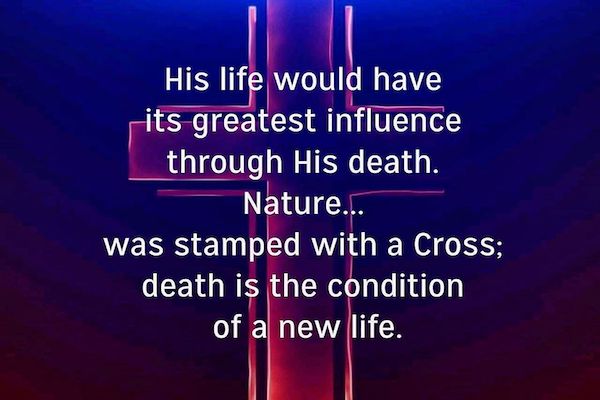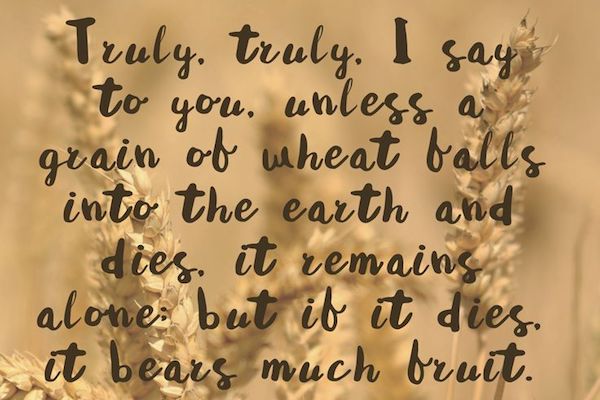LENT 2024: Day 12 - LIFE OF CHRIST

LENT 2024: DAY 12 - Tuesday February 27
“To bring the lesson of Redemption home to the Greeks, He used an example from nature: “Believe Me when I tell you this; a grain of wheat must fall into the ground and die, or else it remains nothing more than a gran of wheat; but if it dies, then it yields rich fruit.” (John 12:24-25)
He had often used many parables about seeds and sowing, and had called Himself a seed: “The Word is the seed.” In one parable he likened His Mission to a seed falling on different kinds of ground, explaining the response different souls made to His grace. Now He revealed that His life would have its greatest influence through His death. Nature, he said, was stamped with a Cross; death is the condition of a new life. The disciples would have kept Him as a seed in the granary of their narrow lives. But if He did not die in order to give new life, He would be a Head without a body, a Shepherd without a flock, a King without a kingdom… He came not to be a moralist, but a Savior. He came not to add to the precepts of Socrates but to give new life; but how could the seed give new life without its Calvary?
The second lesson immediately followed: they should apply the example of His death to themselves. “He who loves his life will lose it; he who is an enemy to his own life in this world will keep it, so as to live eternally.” (John 12:26) No real good is ever done without some cost and pain to the doer.
The Greeks had come to Our Lord saying, “We wish to see Jesus,” probably because of the majesty and beauty of appearance which they revered so highly as followers of Apollo. But He pointed to His torn and battered self on a hill, and then added that only through the Cross in their lives will there ever be beauty of soul in the newness of life.
“And now my soul is distressed. What am I to say? I will say, Father, save Me from undergoing this hour of trial; and yet I have only reached this hour of trial that I might undergo it.” (John 12:27) These are almost the same words that He used later on in the Garden of Gethsemane – words that are inexplicable except for the fact that He was bearing the burden of the world’s sins.
He certainly was not asking to be saved from the Cross, since He reprimanded His Apostles for trying to dissuade Him. Two opposites were united in Him, separated only in utterance: the desire for release, and submission to the Father’s will. By laying bare His own soul, He told the Greeks self-sacrifice was not easy They were not to be fanatics about wanting to die, for nature does not want to crucify itself; but on the other hand, they were not to turn their eyes from the Cross in cowardly dread. In His own case, now as always, the most sorrowful moods pass into the most blissful; there is never the Cross with the Resurrection; the “Hour” in which evil has mastery passes quickly into the “Day” where God is Victor.
At the very moment when He spoke of coming to this Hour to undergo it for the redemption of men: “A voice came from heaven, I have made it known, and will yet make it known.” (John 12:28) The voice of the Father had come to Him on two other occasions when His Mission to the Cross was foremost: at His baptism when He appeared as the Lamb of God to be sacrificed for sin; at His Transfiguration, when He spoke of his death to Moses and Elias while bathed in radiant glory. Now the Voice came, not in a river scene, not on a mountaintop, but above the temple, in the full hearing also of the representatives of the Gentiles.
In each of the three manifestations of the Father, Our Lord was in prayer to His Father, and His sufferings were predominantly before Him. On this occasion it was the effect of His ransoming death that were proclaimed. “It was for your sake, not for Mine, that this utterance was made. Sentence is now being passed on the world; now is the time when the Prince if this world is to be cast out.” (John 12:30-31) The Father spoke to convince His hearers of the purpose of His Mission… The sentence or judgment passed on the world was His Cross. All men, He said, are to be judged by it… No He, but the world, was being judged. Not He, but Satan, was being cast out. The Cross alone mattered; teachings, miracles, fulfillment of prophecies – all these were subordinate to His Mission to earth, to be like a grain of wheat which would pass through the winter of a Calvary and then become the Bread of Life.”

(Chapter 34, pgs. 570-577)
+ FRASES PARA LEER